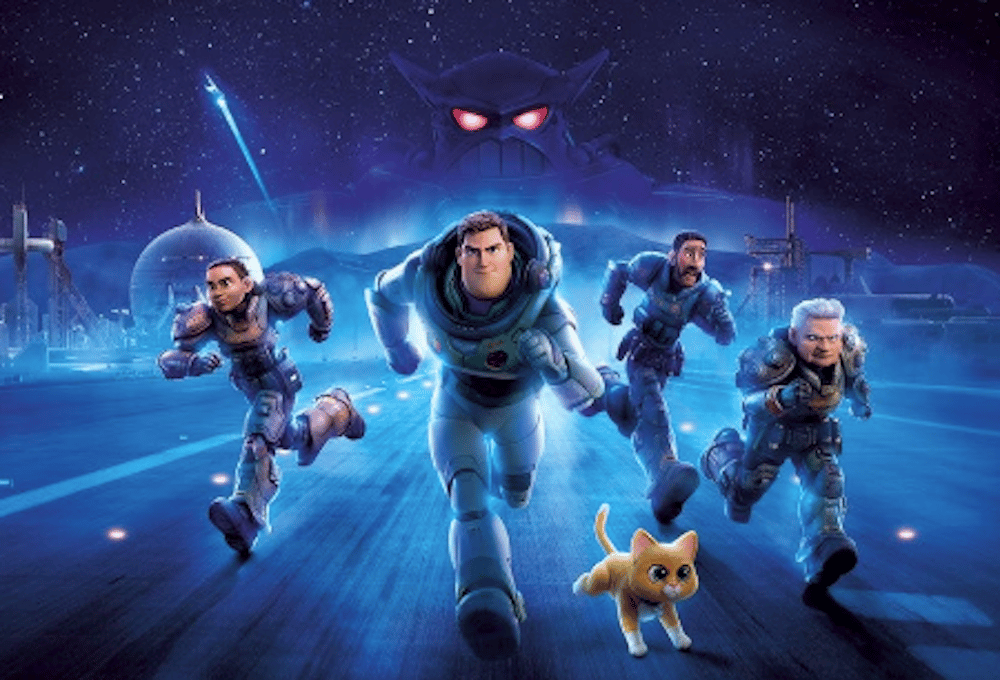Pixar is the rare film studio that does not miss on their releases. Even their “bombs” of The Good Dinosaur and Onward are not bad films; The Good Dinosaur had an unclear plot with even cloudier marketing and Onward had the misfortune of releasing two weeks before national shutdowns went into effect due to the COVID-19 pandemic. Their first major theatrical release in two years, Lightyear, goes into highly meta territory, delivers an exploration of a beloved character but does not manage to deliver on all that is expected of a Pixar film.
The film opens with an introduction connecting Lightyear to the original Toy Story film which immediately aids in the suspension of disbelief. Considering that Pixar has made films featuring rats that can cook, robots that can love, superhero families, talking cars and talking dinosaurs, preemptively telling audiences to suspend their disbelief is not entirely necessary. Lightyear fully embraces the sci-fi side of the iconic character; Buzz and his Space Ranger comrades land on an uncharted planet but wind up becoming marooned thanks to a mistake in Buzz’s piloting and are forced to spend the next few years trying to escape the hostile planet.
Due to their experiments in hyper speed, time moves more quickly for those who remain on the planet while Buzz stays at the same speed so while his test flights last only 4 minutes, four years go by on the planet below. Buzz goes on numerous flights and allows an immeasurable amount of time to pass as colleagues grow old and pass away and the mission is scrapped. This abandonment of the mission is hard for Buzz to handle as he goes AWOL with his robotic cat companion, Sox, to steal a spacecraft and attempt to complete his mission one final time and while he is successful, he winds up 22 years in the future to find the colony is under siege.
In Lightyear’s second and third acts, he is joined by the granddaughter of his former commander who’s afraid of space, a paroled convict who also happens to be an explosives expert and a timid, absent-minded volunteer that is brilliant voiced by Taika Waititi. Hilarity ensues as Buzz refuses to train these rookies and wants to complete the new mission by himself but he must learn to rely on the new recruits like he’s never relied on anyone before.
Every Pixar film is a visual delight and hidden Easter Eggs are all around for the savvy viewer but where Lightyear shines is its respect for past science fiction classics while being bold enough to forge its own lore. There are references to 2001: A Space Odyssey, Alien, Star Wars and even Starship Troopers. Most will right away recognize the hallmarks of Buzz’s character; the mission logs/narration, his use of double adjectives to describe people, catchphrases, forearm laser cannon and his wing pack. It is a delight to see how Pixar took a character originally created as a talking toy and turned him into a meta feast for the eyes.
Lightyear does well to not dwell too long on some of the more fantastical sci-fi elements like Buzz’s hyper speed experiments but where it does get a little in the weeds in the where Buzz meets a version of himself from another timeline. It is unclear if this is evidence of a multiverse but this older Buzz also has access to the robots hunting the younger Buzz and his friends and goes by the name of Zurg among the robots. It is a bit of a letdown after much was made about Buzz and Zurg in the original Toy Story films and their confrontation is short and punctuated by concurrent action. The climax of Lightyear is a clear example of overly ambitious screenwriting.
While Lightyear is full of nostalgic callbacks, great vocal performances, the overall package feels lackluster. It is still an entertaining romp and meta exploration of a beloved character but it is appropriate to question the exact reason to explore Buzz Lightyear. It lacks a central theme found in more beloved Pixar films like Wall-E, Up, Soul and Ratatouille and feels more like a popcorn flick than a film with heart. It is difficult to exactly nail down who this film was made for as adults who grew up familiar with Toy Story will enjoy it but the meta concept is an idea that may not be fully grasped by younger viewers. For those who may be concerned about Chris Evans “replacing” original actor Tim Allen, those concerns can be set aside as Evans makes every effort to make the character his own and not rely on Allen’s separate performance. Ultimately, Lightyear succeeds in ticking off multiple boxes but fails to explore any deeper meaning and may be best left on the short list of Pixar’s perceived failures.



